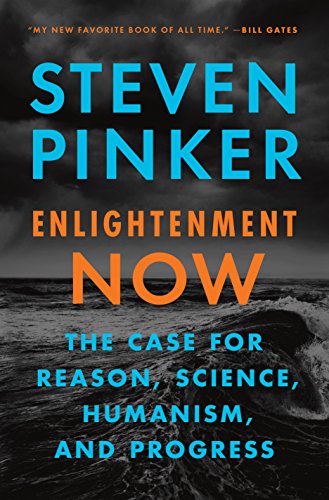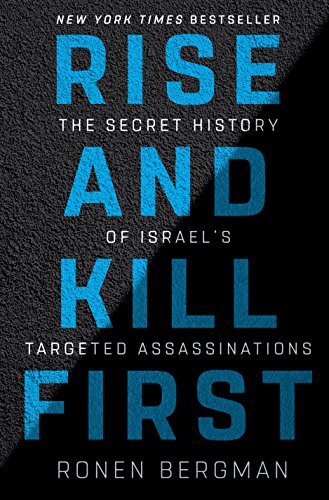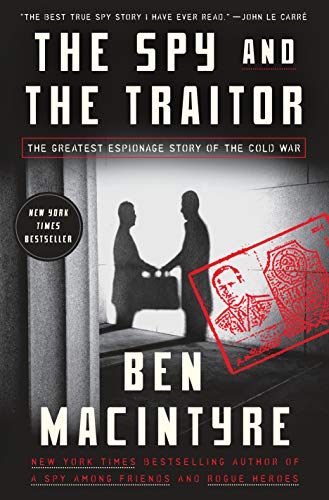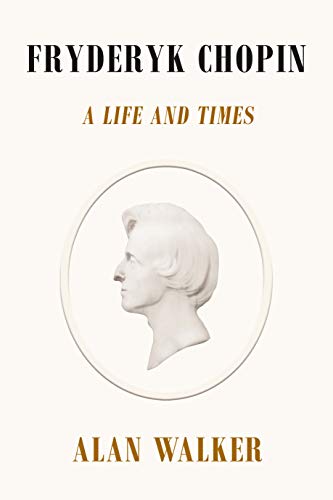
《经济学家》2018年最佳图书
参考:《经济学家》年度最佳图书:2011;2012;2013;2014;2015;2016;2017。
The big read: The Economist’s books of the year
Politics and current affairs
Moneyland: The Inside Story of the Crooks and Kleptocrats Who Rule the World. By Oliver Bullough. Profile Books; 298 pages; £20. To be published in America by St Martin’s Press in May; $28.99
Moneyland is the author’s term for the virtual country into which the world’s mega-rich smuggle their (sometimes ill-gotten) wealth, so insulating it from the attention of tax and other officials. Focused in part on the kleptocrats of the former Soviet Union, the book ranges across the world and a wide cast of lawyers, accountants and mountebanks who see to it that money stolen in poor, ill-run countries can be invested in rich, safe ones. An urgent exposé of a vital subject.
Enlightenment Now: The Case for Reason, Science, Humanism and Progress. By Steven Pinker. Viking; 576 pages; $35. Allen Lane; £25
His critics regard him as Panglossian, and suspect he cherry-picks statistics, but the author’s case for global optimism is entertaining and well-argued. The Enlightenment virtues of reason and education, allied to trade and technology, have made the world richer, safer and even happier, he contends, and the improvements are likely to continue. Populists and demagogues are merely a blip in this consoling counterpoint to the misery of the news.
Fascism: A Warning. By Madeleine Albright. Harper Collins; 254 pages; $27.99 and £16.99
The former secretary of state—and a longtime professor of international relations at Georgetown University—fled both Nazism and communism as a child. She does not deploy the term “fascism” loosely and deplores those who do; instead she cooly analyses the way countries can descend into tyranny. In uncertain times, she observes, many people no longer want to be asked what they think: “We want to be told where to march.”
First Raise a Flag: How South Sudan Won the Longest War but Lost the Peace. By Peter Martell. Hurst; 320 pages; £25
A correspondent based in Juba, capital of the new, troubled country of South Sudan, explains its tragic predicament. A history of slave raids, imperialism and brutal rule by Khartoum leads to independence and civil war. The saga is enlivened by interviews with retired spooks and elderly veterans of the colonial administration.
Into the Hands of the Soldiers: Freedom and Chaos in Egypt and the Middle East. By David Kirkpatrick. Viking; 384 pages; $28. Bloomsbury Publishing; £25
In this pellucid chronicle of Egypt’s trajectory since the toppling of Hosni Mubarak in 2011, the former Cairo bureau chief of the New York Times is almost as scathing about the bungling foreign policy of successive American administrations as he is about Abdel-Fattah al-Sisi, Egypt’s strongman president. The country’s so-called stability, he suggests, is again breeding misery and extremism.
Shadows of Empire. By Michael Kenny and Nick Pearce. Polity; 200 pages; $19.95 and £14.99
The “Anglosphere” is not a term in common parlance. This timely and enlightening book shows that, throughout the 20th century, the idea of a fraternity of English-speaking nations exerted a powerful influence on British politicians, including Churchill and Thatcher. It has resurfaced in Brexiteers’ dreams of invigorated Commonwealth trade.
History
A History of America in 100 Maps. By Susan Schulten. University of Chicago Press; 256 pages; $35. British Library; £30
A collection of maps, by turns beautiful and eccentric, which charts the making of America. It shows the role of maps in exploration and conquest and proves that, while some aspects of American political geography are enduring, much in the country’s make-up has, like the banks of the Mississippi, always been in flux.
Pogrom: Kishinev and the Tilt of History. By Steven Zipperstein. Liveright; 288 pages; $27.95 and £20
The pogrom in Kishinev in 1903 became a byword for anti-Semitic violence for Jews everywhere, its victims blamed variously for their passivity and for having resisted their attackers. The event roused Zionists and Jew-haters alike, and was instrumental in both the publication of the “Protocols of the Elders of Zion” and the establishment (in New York) of the naacp. A gripping, scrupulous history of a seminal but mythologised atrocity.
The China Mission: George Marshall’s Unfinished War, 1945-1947. By Daniel Kurtz-Phelan. W.W. Norton & Company; 496 pages; $28.95
Marshall’s mission to China is much less well-known than his effort to rebuild Europe after the second world war. The former, unlike the latter, failed; China descended into civil war and then a communist dictatorship. This account of the debacle by a former diplomat is both a compelling portrait of a remarkable soldier and statesman and an instructive lesson in the limits of American power, even at its zenith.
Rise and Kill First: The Secret History of Israel’s Targeted Assassinations. By Ronen Bergman. Random House; 784 pages; $35. John Murray; £19.99
For this impressive work of reportage, the author not only spoke to hundreds of Israeli spies but also convinced them to hand over a trove of documents. Then he constructed a thrilling narrative of extreme bravery and compromised morality.
Business and economics
We the Corporations: How American Businesses Won Their Civil Rights. By Adam Winkler. Liveright; 496 pages; $28.95
“For most of American history”, the author comments, “the Supreme Court failed to protect the dispossessed and the marginalised, with the justices claiming to be powerless in the face of hostile public sentiment.” Meanwhile “the court has insisted that broad public sentiment favouring business regulation must bend to the demands of the constitution.” A lively survey of a neglected but important feature of American history.
AI Superpowers: China, Silicon Valley and the New World Order. By Kai-Fu Lee. Houghton Mifflin Harcourt; 272 pages; $28
A former manager at assorted American tech giants—and now the boss of a Chinese venture-capitalist fund—anticipates the coming contest to dominate artificial intelligence. He thinks China will crush Silicon Valley because it has more data, disdains privacy and competes more ruthlessly. Thought-provoking, if not altogether convincing.
Radical Markets: Uprooting Capitalism and Democracy for a Just Society. By Eric Posner and E. Glen Weyl. Princeton University Press; 368 pages; $29.95 and £24.95
A law professor and an economist argue that the way out of liberalism’s impasse is to expand the role of markets, not to subdue them. Some of their ideas—on property rights, elections, immigration and much besides—are impractical, and others eccentric; but together they point to a possible response to the challenges of populism and protectionism.
EuroTragedy: A Drama in Nine Acts. By Ashoka Mody. Oxford University Press; 672 pages; $34.95 and £25.49
A comprehensive and authoritative history of the euro which argues that the project was a predictable error. Written by a former senior official at the imf, the book laments the intellectual failures present at the foundation of the single-currency area and in the mishandled response to the sovereign-debt crisis after 2010.
Crashed: How a Decade of Financial Crises Changed the World. By Adam Tooze. Viking; 720 pages; $35. Allen Lane; £30
This panoramic survey of the aftermath of the financial crash of 2008 has four main themes: the immediate response, in which the banks were rescued; the euro-zone crisis; the shift in the developed world after 2010 to more austere fiscal policies; and the rise of populist politics in Europe and America in the wake of the debacle. The author has little faith in the ability of governments to take decisive action when the next crisis hits.
Biography and memoir
The Wife’s Tale: A Personal History. By Aida Edemariam. Harper; 314 pages; $26.99. Fourth Estate; £16.99
The author’s Ethiopian grandmother, Yetemegnu, was married at the age of eight to a religious student more than 20 years her senior. By 14 she was a mother. She fled her husband’s mistreatment, yet when he was arrested she petitioned the emperor on his behalf; on his death she mourned “my husband, who raised me”. The family sought sanctuary in the mountains when the Italians invaded in 1935. This intimate memoir is also an oblique chronicle of Ethiopia’s turbulent history.
Educated. By Tara Westover. Random House; 385 pages; $28. Hutchinson; £14.99
A riveting memoir of a brutal upbringing. The author grew up in a normally opaque environment: a Mormon survivalist household in Idaho, where she endured abuse and received no education. Despite not setting foot in a classroom until she was 17, she made it to university and wound up with a phd from Cambridge.
Barracoon: The Story of the Last “Black Cargo”. By Zora Neale Hurston. Amistad; 208 pages; $24.99. HQ; £12.99
Zora Neale Hurston’s study of Kossula, later called Cudjo Lewis, one of the last Africans to be kidnapped into slavery in America, has never been commercially published before. Interviewed at his home in Alabama in 1927-28, he vividly recalled his capture and illegal transportation on the eve of America’s civil war: “I think maybe I die in my sleep when I dream about my mama.” A devastating book.
Napoleon: A Life. By Adam Zamoyski. Basic Books; 784 pages; $40. William Collins; £30
Some of his critics portray him as a monster; enthusiasts have characterised him as a demi-god. In this superlative account, Napoleon is a mortal, with great virtues and equally great flaws, at once dazzling and gauche. “From the sublime to the ridiculous”, Napoleon himself said after his disastrous campaign in Russia, “there is but one step.”
Churchill: Walking with Destiny. By Andrew Roberts. Viking; 1,152 pages; $30. Allen Lane; £35
Of the many biographies of Winston Churchill, this is the fullest. Acknowledging its subject’s flaws and sometimes catastrophic mistakes, it nevertheless makes a compelling case for his greatness, both as a statesman and a writer. More unusually, by evoking his wit, generosity and courage, it also succeeds in making him lovable. “I was not the lion,” Churchill said, “but it fell to me to give the lion’s roar.”
Gandhi: The Years That Changed the World 1914-1948. By Ramachandra Guha. Knopf; 1,104 pages; $40. Allen Lane; £40
At a time of rising Hindu nationalism, the Mahatma’s values and example are as relevant as ever in his homeland. This second volume of a magisterial biography begins in 1914, when Gandhi returned to India from South Africa. It conveys his charisma, his intellect and the evolution of his political beliefs, including his advocacy of Hindu-Muslim reconciliation.
The Spy and the Traitor: The Greatest Espionage Story of the Cold War. By Ben Macintyre. Crown; 368 pages; $28. Viking; £25
Oleg Gordievsky, a vital Western asset inside the kgb, was smuggled across the Soviet Union’s border with Finland in the boot of a car. The story of Mr Gordievsky’s life, and that of Aldrich Ames, the renegade cia officer who outed him, is told with the gusto of a thriller. A fitting tribute to a brave but lonely man.
Culture
The Personality Brokers. By Merve Emre. Doubleday; 336 pages; $27.95. Published in Britain by William Collins as “What’s Your Type?”; £20
The Myers-Briggs Type Indicator, the best-known personality test, is the focus of an entertaining cultural history of the personality-assessment industry. It was invented by a mother-and-daughter team, under the influence of Carl Jung. Its enduring popularity ought not to be surprising: after all, it offers both the “rush of self-discovery” and “the comfort of solidarity” with others of the same type.
The Prodigal Tongue. By Lynne Murphy. Penguin Books; 368 pages; $17. Oneworld; £16.99
The first and perhaps only book on the relative merits of American and British English that is dominated by facts and analysis rather than nationalistic prejudice. For all its scholarship, this is also a funny and rollicking read.
Space Odyssey: Stanley Kubrick, Arthur C. Clarke and the Making of a Masterpiece. By Michael Benson. Simon & Schuster; 512 pages; $30 and £25
An illuminating account of a collaboration that resulted in a landmark film. The author’s scientific background helps him to explain its pathbreaking visual effects. The making of a great work of art has rarely been anatomised so thoroughly.
Astounding: John W. Campbell, Isaac Asimov, Robert A. Heinlein, L. Ron Hubbard and the Golden Age of Science Fiction. By Alec Nevala-Lee. Dey Street Books; 544 pages; $28.99. To be released in Britain in August; £10.99
An indispensable book for anyone trying to understand the birth and meaning of modern science fiction in America from the 1930s to the 1950s—a genre that reshaped how people think about the future, for good and ill.
Boom Town: The Fantastical Saga of Oklahoma City, its Chaotic Founding… its Purloined Basketball Team, and the Dream of Becoming a World-class Metropolis. By Sam Anderson. Crown; 448 pages; $28
The fortunes of the Thunder, Oklahoma City’s basketball team, become a metaphor for the city’s own history in a hymn to an unsung metropolis. In this colourful compendium of heroism, skulduggery, land-grabs, oil and violence, its subject emerges as equal parts Wild West and Oz.
Fryderyk Chopin: A Life and Times. By Alan Walker. Farrar, Straus and Giroux; 768 pages; $40. Faber & Faber; £30
Chopin’s romantic life—he was a child prodigy who ran off with George Sand before dying at 39—has had many chroniclers. This definitive account draws on new sources to shed light on his career and volatile times. The man behind the myth emerges as an amiable perfectionist.
Fiction
The Long Take. By Robin Robertson. Knopf; 256 pages; $27. Picador; £14.99
The wondrous story of a Canadian veteran of the second world war who washes up in New York and then Los Angeles—told mostly in verse. Walker, the protagonist, is haunted by his experiences in combat and by memories of his youth, and pained by the neglect of the homeless in California. Probably the best novel of the year.
The Silence of the Girls. By Pat Barker. Doubleday; 304 pages; $27.95. Hamish Hamilton; £18.99
The “Iliad” reimagined from the perspective of Briseis, the captured slave-girl who is the cause of the quarrel between Achilles and Agamemnon that animates Homer’s epic—and in the original is almost silent. The technicolour horrors of war are accompanied by similes of almost Homeric brilliance.
Washington Black. By Esi Edugyan. Knopf; 352 pages; $26.95. Serpent’s Tail; £14.99
The title character of this poignant saga is born into slavery on a sugar plantation in Barbados; he escapes in the company of an eccentric inventor, a slave-catcher on his trail, before wandering across several continents. An original and compulsive exploration of a tragic subject.
Milkman. By Anna Burns. Graywolf Press; 360 pages; $16. Faber & Faber; £8.99
The winner of this year’s Man Booker prize is set during the Troubles in Northern Ireland in an unnamed city that looks like Belfast. “Middle sister”, the protagonist (nobody in the book has a conventional name), is stalked by a paramilitary. A haunting depiction of the impact of violence on ordinary lives.
Love is Blind. By William Boyd. Knopf; 384 pages; $26.95. Viking; £18.99
The tale of a Scottish piano-tuner infatuated with a Russian opera singer gallops across fin-de-siècle Europe, from Paris to St Petersburg to Trieste, then onwards to the Andaman Islands. A treat for the author’s many fans and a masterclass in old-fashioned storytelling.
Normal People. By Sally Rooney. Faber & Faber; 266 pages; £14.99. To be published in America by Hogarth in April; $26
A beautiful portrait of an on-off relationship between two Irish youngsters, at school and university. The scrutiny of their self-deceptions is at once unforgiving and tender. The tango of power is masterfully conveyed in their dialogue.
Fire Sermon. By Jamie Quatro. Grove Press; 224 pages; $24. Picador; £14.99
A lyrical, experimental novel about faith and adultery, divine and erotic love, worship and transgression, from an accomplished writer of short stories.
Science and Technology
Beyond Weird: Why Everything You Thought You Knew about Quantum Physics Is Different. By Philip Ball. University of Chicago Press; 384 pages; $26. Bodley Head; £17.99
Most books on quantum mechanics emphasise its weirdness, a built-in excuse for being baffling. Wearing deep learning lightly, this author explains his subject simply and thoughtfully, revealing the theory’s true power as a way of knowing what can be said about nature.
Rocket Men: The Daring Odyssey of Apollo 8 and the Astronauts Who Made Man’s First Journey to the Moon. By Robert Kurson. Random House; 384 pages; $28. Scribe; £18.99
A gripping account of Apollo 8, the first manned space flight around the Moon. The story of the dangerous mission that laid the ground for the Moon landing has not been told in such detail until now.
Nine Pints: A Journey Through the Money, Medicine and Mysteries of Blood. By Rose George. Metropolitan Books; 368 pages; $30. Portobello Books; £14.99
This history of blood takes its name from the quantity in a human body. The author visits high-tech facilities, a South African slum and Nepalese villages to convey, scintillatingly, what is known and what remains mysterious about the liquid.





































